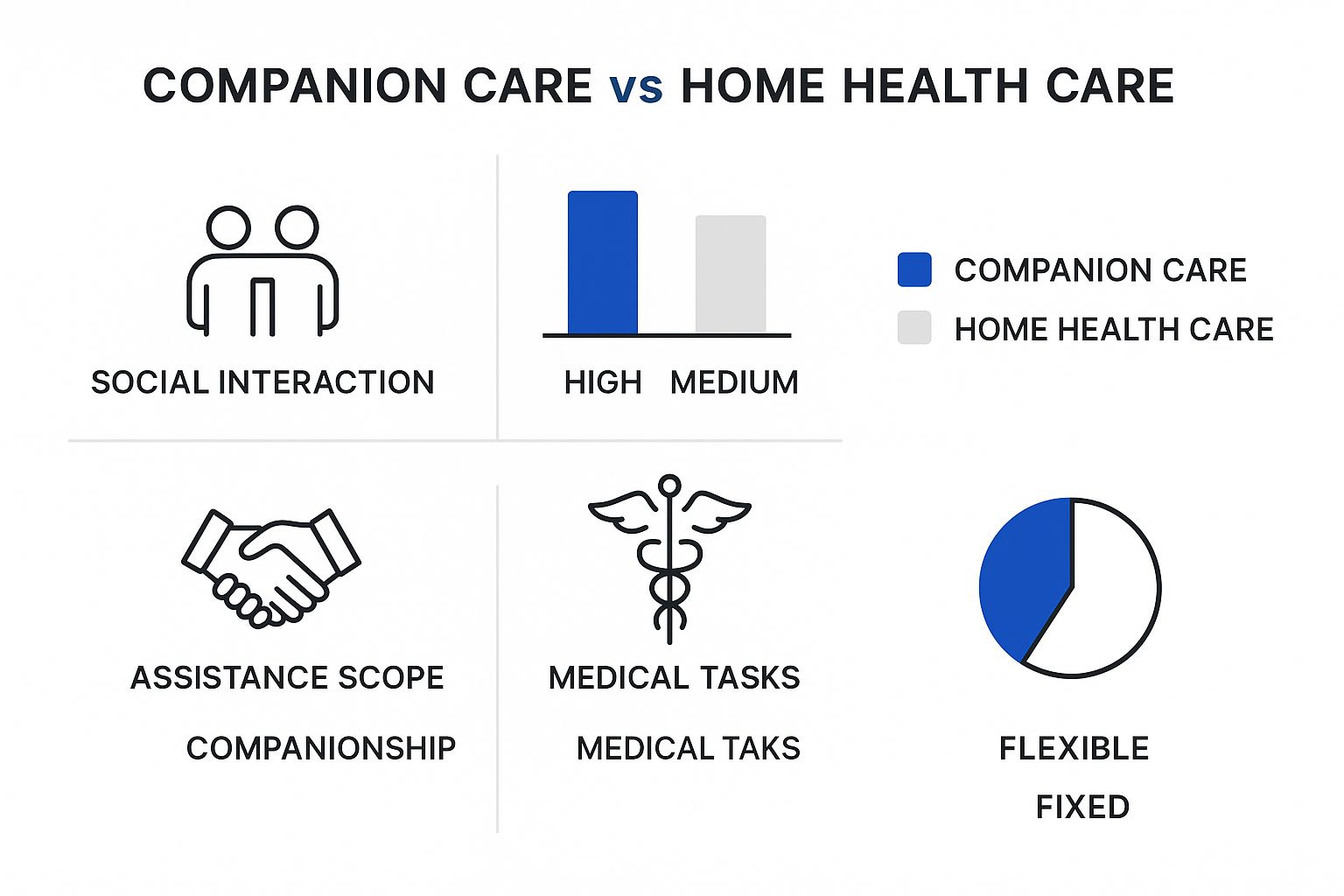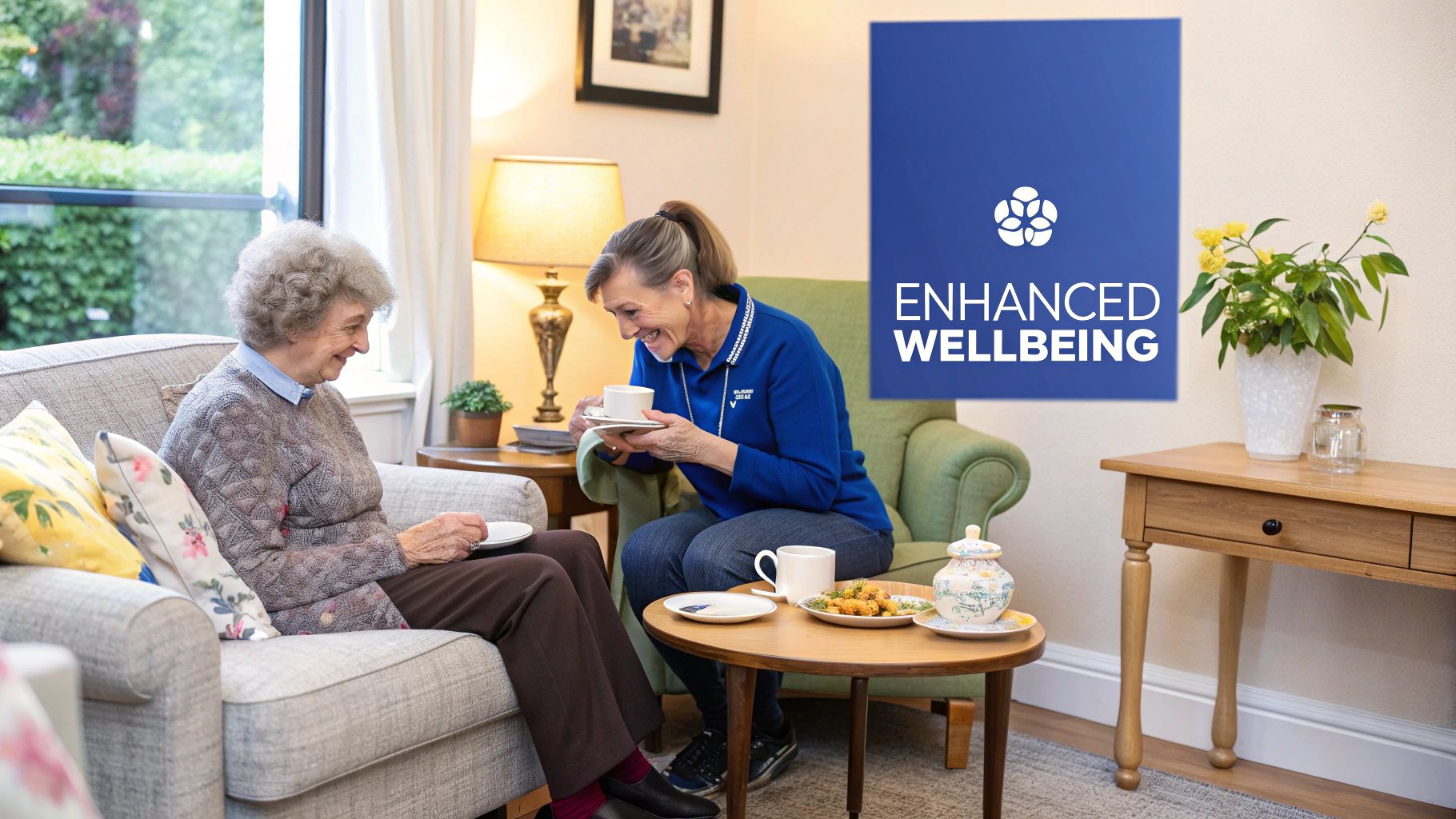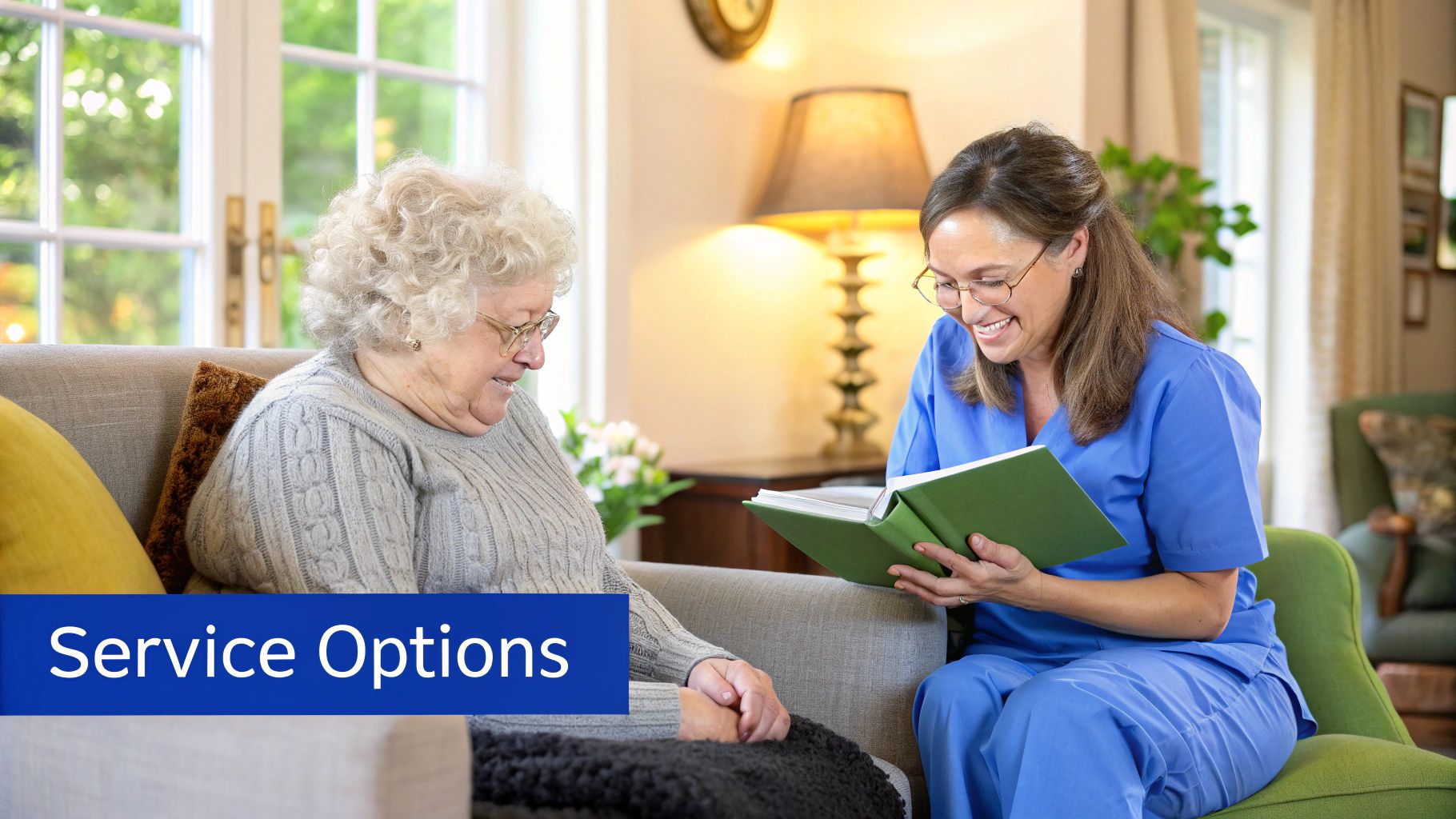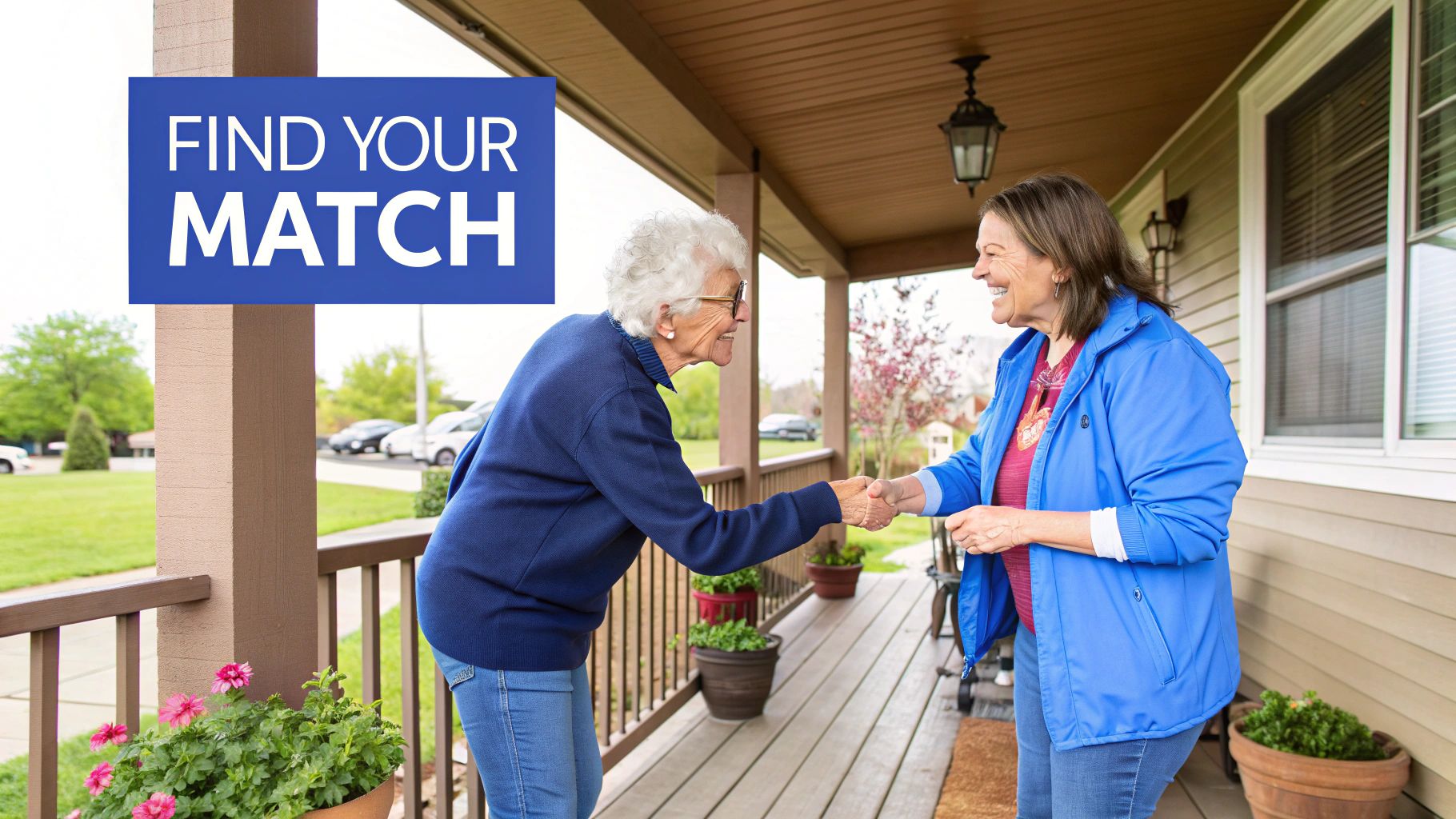Companion care is all about providing non-medical support to seniors and people with disabilities, with a real focus on friendship and emotional well-being. Think of it less like a service and more like a trusted friend who's there to brighten someone's day, beat back loneliness, and help them stay independent in their own home.
What Companion Care Services Truly Mean
Imagine a friendly face stopping by a few times a week—not to check vitals or administer medicine, but to share a cup of tea, tackle a crossword puzzle, or help with a trip to the grocery store. That’s the heart and soul of companion care. It’s a service built on the simple power of human connection, designed to boost a person's quality of life by meeting those often-overlooked needs for social time and comfort.
This is a world away from home health aides or personal care assistants. Those roles are crucial for medical needs or hands-on help with things like bathing and dressing. Companion care services, on the other hand, are focused on the whole person. The goal isn't just to keep someone safe, but to help them feel vibrant, engaged, and truly happy in the place they know best: their own home.
The Core Philosophy of Companionship
At its core, professional companionship is a powerful defense against social isolation. We know that loneliness can take a serious toll on both mental and physical health, especially for older adults living by themselves. Companion care meets this problem head-on by providing consistent, genuine interaction.
A companion's role is wonderfully varied, but it usually centers on a few key areas:
- Emotional Support: Simply being there to listen, share in meaningful conversations, and offer a comforting, steady presence.
- Social Engagement: Joining in on hobbies, going out to community events, or just enjoying a favorite TV show together at home.
- Practical Assistance: Lending a hand with light housekeeping, preparing simple meals, and running errands to make daily life run a little smoother.
The real magic of companion care isn't just in the tasks they do, but in the relationship they build. It gives families incredible peace of mind, knowing their loved one has a reliable friend looking out for their happiness and safety.
Ultimately, these services empower people. By offering just the right amount of support, companion care helps individuals stick to their routines, dive into their interests, and feel connected to the world around them, keeping that sense of purpose and independence alive and well.
What a Companion Caregiver Actually Does
It's easy to get caught up in the idea of "companionship," but what does a companion caregiver really do day-to-day? Think of them less like a visitor and more like a supportive partner in your loved one's daily life. Their focus is on the non-medical social, emotional, and household needs that make life not just manageable, but genuinely more enjoyable.
Their role is wonderfully broad, but it always comes back to improving quality of life. This could look like preparing a light, nutritious lunch while swapping stories, or spending an afternoon playing cards to keep the mind sharp and spirits high. It's about weaving practical help into moments of real human connection.
Fostering Social and Emotional Well-being
One of the biggest jobs of a companion caregiver is to fight back against the loneliness and isolation that can creep in for many seniors. We know that social interaction is a huge predictor of health, and companions are there specifically to provide that vital link.
This kind of support often includes:
- Engaging Conversation: Sharing memories, talking about the news, or just being a patient, active listener.
- Hobbies and Activities: Joining in on favorite pastimes, whether that’s gardening, working on a puzzle, reading a book aloud, or watching a classic movie.
- Encouraging Connection: Helping your loved one stay in touch with family and friends through letters, email, or setting up a video call.
This infographic does a great job of showing how companion care differs from more medically-focused home health care.

As you can see, home health care is centered on specific medical tasks with a fixed schedule. Companion care, on the other hand, is all about flexible, non-medical support and genuine social interaction.
Practical Help Around the House and Community
Beyond the social side, companion care also provides essential hands-on help with everyday tasks that may have become a challenge. This support helps keep the home safe, comfortable, and running smoothly. The caregiver also acts as a bridge to the outside world, helping with crucial errands and appointments.
A companion’s goal is to handle the small stressors of daily life, freeing up your loved one's energy to focus on what brings them joy and fulfillment. This practical help is often the foundation upon which a trusting relationship is built.
Common responsibilities here include light housekeeping—things like dusting, vacuuming, and doing a load of laundry. They can also help with meal planning and preparation, which is key for maintaining a healthy diet.
On top of that, caregivers can manage grocery shopping lists, run errands, and provide transportation to doctor’s appointments, social events, or community gatherings. This support empowers seniors to keep their independence and continue doing the things they love with confidence. Understanding the full scope is key, and you can explore a detailed caregiver job description to see how these duties all fit together.
The True Benefits of Professional Companionship
Companion care goes so much deeper than just lending a hand with daily chores. It gets to the heart of what makes us human, tackling the profound emotional and psychological needs that are essential for a good life, especially as we get older. Think of these services as a powerful antidote to loneliness, a serious condition that researchers have linked to significant health risks.
Imagine the simple, quiet comfort of knowing a friendly, familiar face is regularly checking in on your loved one. This isn't just about social interaction; it's an invaluable layer of safety and security. For families who live far away or are juggling demanding schedules, that peace of mind is immeasurable.

This kind of support is becoming more critical every day. The numbers tell the story: within the broader geriatric care market, home care services are booming, with a projected compound annual growth rate of 10.7%. This shift is happening because most people simply want to age in the comfort of their own home, a preference that enhances dignity and lowers health risks like hospital readmissions. You can explore more data on the geriatric care services market to see the full picture.
Promoting Independence and Active Living
There’s a common myth that bringing in a caregiver means a loss of independence. But the reality is just the opposite. Professional companionship actively encourages it. By helping with errands, transportation, and light household chores, caregivers free up an individual's energy for the things they really want to do.
This support can be the spark that reignites a passion for old hobbies or community activities. A companion might help with gardening, join in a game of cards, or provide a ride to a local senior center event. It’s all about fostering an active, engaged lifestyle and reinforcing that vital sense of purpose and connection.
The true value of companionship lies in its ability to transform a daily routine into a life filled with connection, activity, and joy. It's about adding life to years, not just years to life.
An Illustrative Story of Renewed Connection
Take Arthur, an 82-year-old widower. He used to love his weekly chess club, but after a minor fall, he grew too nervous to drive. His world shrank, and soon it was just him, his home, and the television. Seeing this, his family arranged for a companion, Mark, to visit a couple of times a week.
At first, Mark just helped with groceries. But they soon discovered a shared love for chess. Before long, Mark was driving Arthur to his club meetings, where he reconnected with old friends and rediscovered his favorite pastime. That simple act of providing a ride and some encouragement didn't just get him out of the house—it restored a huge piece of his social identity and brought genuine joy back into his life.
Who Is the Right Fit for Companion Care?
Figuring out if companion care is the right move usually starts by noticing small, but important, changes in a loved one's daily life. It’s rarely about a sudden crisis. More often, it's a gradual shift that hints at a growing need for more social connection and a bit of light support around the house.
This kind of care is incredibly versatile, designed for a wide range of people who don't need medical help but would absolutely blossom with a friendly face and a helping hand. Think of it as a way to proactively boost someone's quality of life before challenges like deep loneliness or household neglect turn into serious problems. Catching the signs early can make all the difference.

Key Profiles That Benefit Most
While every person's story is unique, there are a few common situations where companion care services really shine. These are typically folks who cherish their independence but are starting to face little hurdles that a companion can help them clear, allowing them to stay comfortable and safe right where they want to be—at home.
Companion care is often a perfect match for:
- Seniors Living Alone: Isolation is a huge risk for older adults living by themselves, especially if they've lost a spouse. A companion brings regular conversation and shared activities back into their life, which is a powerful antidote to loneliness.
- Individuals Recovering from Surgery: After coming home from the hospital, someone might not need a nurse, but they could definitely use some help with errands, cooking, and light housekeeping while they get back on their feet.
- Adults with Disabilities: For those working toward greater independence, a companion can be a fantastic ally, assisting with daily tasks and encouraging community engagement to build confidence.
- Couples Needing Extra Support: In many cases, one spouse acts as the primary caregiver for the other. A companion can step in to provide respite, giving the caregiving spouse a much-needed break to rest and recharge.
Recognizing the Signs It's Time for Help
The need for a companion doesn't usually announce itself with a single, dramatic event. Instead, it shows up in subtle clues. Paying attention to these quiet signals can help you see when your loved one might benefit from some extra support. It's all about looking for patterns that suggest daily life is becoming more of a struggle.
Noticing these signs is the first step toward a solution. It's not about a loss of independence but rather an opportunity to reinforce it with the right kind of support, ensuring safety, health, and happiness.
Here are some of the most common signs to watch for:
- Changes in Home Environment: Is mail piling up? Has the house become less tidy? Finding expired food in the fridge can be a clear sign that household chores are getting to be too much.
- Shifts in Social Behavior: Your loved one might talk more about feeling lonely, or maybe they've stopped enjoying hobbies and social outings they once loved.
- Missed Appointments or Obligations: Forgetting doctor's appointments or struggling to pay bills on time can indicate that keeping track of everything has become difficult to manage alone.
- Noticeable Changes in Appearance: A decline in personal grooming or hygiene often points to a lack of energy or motivation, which can be tied directly to feelings of isolation.
If you’re starting to see these patterns, it might be the perfect time to explore how professional companion care services could help.
Navigating the Costs of Companion Care
Let’s talk about the financial side of companion care. It’s one of the first and most important questions families have, and while the numbers can feel a bit daunting at first, breaking them down makes it all much more manageable. Think of it as an investment in a loved one's comfort and quality of life.
The final price tag really depends on a few key things: where you live, how many hours of support are needed each week, and exactly what kind of help you’re looking for. Most agencies will charge by the hour, which gives you a lot of flexibility, but some also offer service packages for more predictable schedules.
The demand for this kind of in-home support is growing fast. The global home care market, which includes non-medical services like companion care, was valued at around USD 595.10 billion in 2025 and is on track to nearly double by 2032. That's a huge number, and it tells us one thing loud and clear: more and more families want their loved ones to age comfortably and safely in their own homes. If you're interested in the data, you can review the home care service market analysis on coherentmarketinsights.com.
Common Ways to Pay for Care
Once you have an idea of the potential costs, the next step is figuring out how to cover them. While many families pay for care out of pocket, there are several other options that can make these essential services much more affordable. It's always a good idea to explore every avenue.
It's a common misconception that Medicare covers non-medical companion care. For the most part, it doesn't. Medicare is designed to pay for skilled medical services, not companionship or help around the house.
Here are a few of the main funding sources to look into:
- Long-Term Care Insurance: This is a big one. If your loved one has a policy specifically designed for non-medical in-home care, it can be a lifesaver. You’ll just need to dive into the policy details to understand the coverage limits and what’s required to start using it.
- Veterans' Benefits: Programs like the VA Aid and Attendance benefit can provide monthly payments to help qualifying veterans and their spouses cover the cost of in-home care. It's definitely worth checking eligibility.
- Private Pay: Many families use savings, retirement funds, or other personal assets to pay for services directly. This is the most straightforward route if other options aren't available.
Working through the financial side of things can feel like a lot to handle, but you don't have to figure it all out on your own. For a much more detailed guide, take a look at our article on understanding in-home care costs in New Jersey.
Choosing the Right Companion Care Provider
Finding the right companion care provider is easily one of the most personal and important decisions you’ll make for a loved one. This isn't just about logistics; it's about inviting a trusted partner into your family's life—someone who can offer comfort, ensure safety, and provide genuine friendship.
The process really starts with an honest look at your family's specific needs. Before you even think about calling agencies, sit down and map out what a typical day looks like and where the gaps are. Consider the specific tasks needed, how many hours of help you might need each week, and—just as important—your loved one's personality and interests. This little bit of prep work acts as your roadmap, steering you toward a provider that feels like a natural fit, not just a generic service.

Key Questions to Ask Potential Providers
Once you've got a shortlist of potential agencies, it's time to start the conversation. A quality provider will welcome your questions and be completely transparent with their answers. Your main goal here is to get a feel for their process, their standards, and their core philosophy of care to make sure it all lines up with what your family needs.
Here are a few essential questions to get you started:
- Screening and Training: What's your screening process for caregivers like? Do you run background checks? What kind of initial and ongoing training do they get?
- Matching Process: How do you match caregivers to clients? Do you take personality, hobbies, and specific needs into account to find the right fit?
- Oversight and Communication: Who supervises the caregiver, and how often? How do you keep the family in the loop with updates or concerns?
- Backup Plan: What’s the plan if our regular caregiver is sick or can't make it? How do you make sure there are no gaps in care?
- Insurance and Liability: Is the agency bonded and insured? This is a big one—it protects your family from liability if an accident happens on your property.
This vetting process is all about giving you peace of mind. For a more detailed list of questions, our guide on how to choose a home care agency has some great additional tips.
Agencies Versus Independent Caregivers
Another fork in the road is deciding whether to go through an agency or hire an independent caregiver directly. While hiring someone on your own might seem cheaper upfront, working with an agency brings some major advantages, especially when it comes to safety and reliability.
An agency takes care of all the tricky administrative stuff—like payroll, taxes, insurance, and detailed background checks—that can become a real headache for families. They also handle all the scheduling and have backup caregivers ready, so you know your loved one will never be left without support.
In the end, choosing the right provider comes down to doing your homework and trusting your gut. By taking the time to assess your needs and ask the right questions, you can feel confident that you're picking a partner who will truly improve your loved one's quality of life.
Frequently Asked Questions About Companion Care
When you're looking into support for a loved one, a lot of questions come up. It's totally normal. Getting clear, straightforward answers is the best way to feel confident you're making the right call. We've put together some of the most common questions we hear about companion care services to give you the practical info you need.
Navigating the world of in-home support can feel a little overwhelming at first, but once you get the hang of the terms and what they mean, it all starts to make sense. Let's clear up some of the key things families wonder about when they start their search.
What Is the Difference Between Companion, Personal, and Home Health Care?
This is probably the most important thing to get straight right from the start. It’s helpful to think of them as different levels of support, each with its own specific job.
- Companion Care: This is all about social and emotional well-being. It's completely non-medical and focuses on things like friendship, conversation, light housekeeping, preparing meals, and running errands. The whole point is to beat back loneliness and just make life more enjoyable.
- Personal Care: This level steps it up to include hands-on, non-medical help with what experts call Activities of Daily Living (or ADLs). A personal care aide can help with bathing, getting dressed, grooming, and moving around safely.
- Home Health Care: Now we're in the medical lane. This is skilled care that has to be ordered by a doctor. It's provided by licensed professionals like registered nurses or physical therapists and involves tasks like wound care, giving injections, or managing IVs.
The simplest way to put it? Companion care is about friendship and a helping hand. Personal care is about hands-on physical support. And home health care is medical treatment at home.
How Do Agencies Match Caregivers with Clients?
A great companionship experience really hinges on the right match. A good agency knows this and won't just send whichever caregiver is free. They put real thought into creating a strong, positive connection from day one.
The process usually starts with a deep dive into your loved one's needs, their personality, and what they enjoy doing. The agency then looks for a caregiver who has a similar temperament, maybe shares a few hobbies, and has the right skills for the job. The goal is to find someone who feels less like a helper and more like a true friend.
Can Companion Care Be Provided Outside of a Private Home?
Yes, absolutely. While we most often think of companion care services happening in someone's house, the support is flexible and can go wherever your loved one calls home. This is a huge benefit because it means they can have consistent, one-on-one attention no matter the setting.
For example, a companion can be a friendly face and supportive presence for someone living in:
- An assisted living facility
- An independent living community
- A hospital, providing extra comfort and a watchful eye during a stay
This kind of flexibility helps fill in any gaps in care, ensuring that vital social and emotional support never has to stop.
At NJ Caregiving, we believe that finding the right companion is about creating a meaningful connection that truly enriches a person's life. If you have more questions or are ready to explore personalized care options in the Princeton area, we are here to help. Learn more about our compassionate approach at https://njcaregiving.com.


